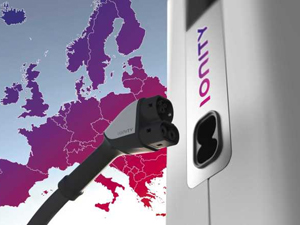



Date:07/11/17
 BMW Group, Daimler, Ford Motor Company, and the Volkswagen Group (with subsidiaries Audi and Porsche) will join up to create a high-power charging network for electric vehicles called “Ionity,” which will build and operate around 400 charging stations across Europe by 2020.
BMW Group, Daimler, Ford Motor Company, and the Volkswagen Group (with subsidiaries Audi and Porsche) will join up to create a high-power charging network for electric vehicles called “Ionity,” which will build and operate around 400 charging stations across Europe by 2020.
The collaborative venture formed by the automakers is intended to make it easier for Europeans to manage long road trips using electric cars, and to put in place a key infrastructure component needed to make electric vehicles a viable option for general consumer use.
The Ionity brand will operate around 20 stations by the end of this year, and then aims to have 50 available in 2018. Each charging point will have a capacity of as much as 350 kW, and the intent is for the charging to be brand-agnostic using the Combined Charging System (or CCS) standard. The CCS standard is supported by VW, GM, BMW, Daimler, Ford FCA, Tesla and Hyundai, and current vehicles that support it, including the Bolt EV, max out at 50 kW quick charging.
Ionity will pick spots for its chargers based on negotiations with political institutions and private companies and aims to put them in, in concert with existing infrastructure initiatives which are ongoing.
This is a big moment for the acceleration of electric vehicle adoption – an automaker joint venture like this one with its considerable brand power will go a long way toward making sure the charging network can meet future demand as more models become available and demand increases among consumers.
BMW, Daimler, Ford and Volkswagen team up on high-power charging network
 BMW Group, Daimler, Ford Motor Company, and the Volkswagen Group (with subsidiaries Audi and Porsche) will join up to create a high-power charging network for electric vehicles called “Ionity,” which will build and operate around 400 charging stations across Europe by 2020.
BMW Group, Daimler, Ford Motor Company, and the Volkswagen Group (with subsidiaries Audi and Porsche) will join up to create a high-power charging network for electric vehicles called “Ionity,” which will build and operate around 400 charging stations across Europe by 2020.The collaborative venture formed by the automakers is intended to make it easier for Europeans to manage long road trips using electric cars, and to put in place a key infrastructure component needed to make electric vehicles a viable option for general consumer use.
The Ionity brand will operate around 20 stations by the end of this year, and then aims to have 50 available in 2018. Each charging point will have a capacity of as much as 350 kW, and the intent is for the charging to be brand-agnostic using the Combined Charging System (or CCS) standard. The CCS standard is supported by VW, GM, BMW, Daimler, Ford FCA, Tesla and Hyundai, and current vehicles that support it, including the Bolt EV, max out at 50 kW quick charging.
Ionity will pick spots for its chargers based on negotiations with political institutions and private companies and aims to put them in, in concert with existing infrastructure initiatives which are ongoing.
This is a big moment for the acceleration of electric vehicle adoption – an automaker joint venture like this one with its considerable brand power will go a long way toward making sure the charging network can meet future demand as more models become available and demand increases among consumers.
Views: 352
©ictnews.az. All rights reserved.Similar news
- Azerbaijani project to monitor disease via mobile phones
- Innovative educational system to be improved under presidential decree
- NTRC prolongs license of two TV and radio organizations for 6 years
- Azerbaijan establishes e-registry for medicines
- Azerbaijani museum introduces e-guide
- Nar Mobile opens “Nar Dunyasi” sales and service center in Siyazan city
- International conference on custom electronic services held in Baku
- OIC secretary general to attend COMSTECH meeting in Baku
- Azerbaijan develops earthquake warning system
- New law to regulate transition to digital broadcasting in Azerbaijan
- Azerbaijani State Social Protection Fund introduces electronic digital signature
- Intellectual traffic management system in Baku to be commissioned in December
- Tax Ministry of Azerbaijan started receiving video-addresses
- World Bank recommends Azerbaijan to speed up e-service introduction in real estate
- Azerbaijan to shift to electronic registration of real estate





















